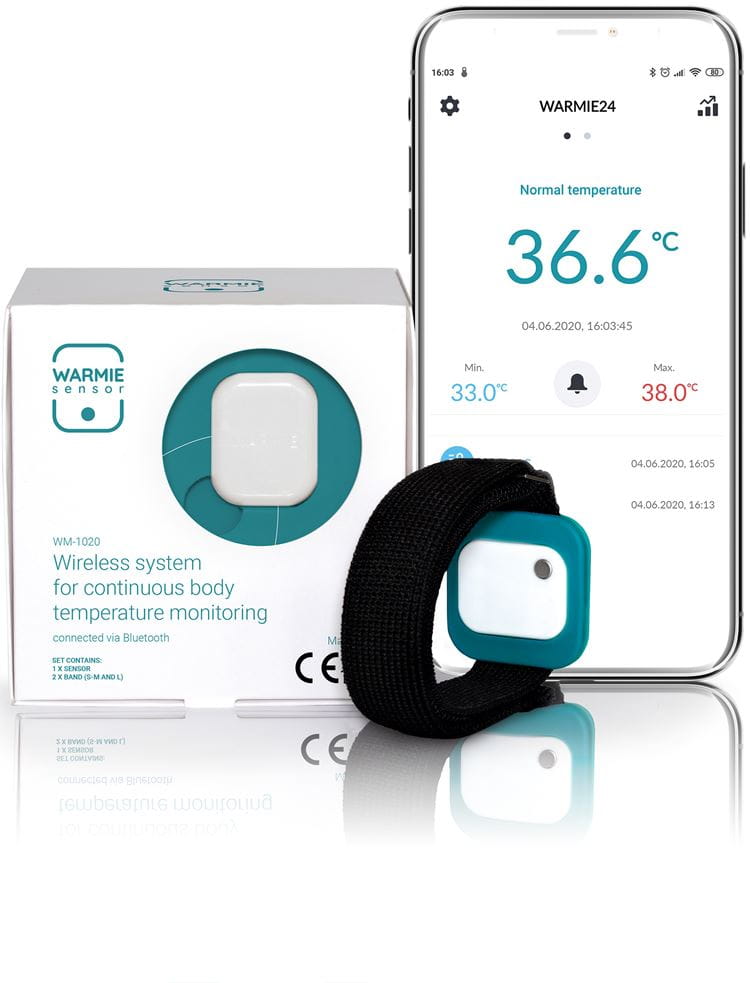Connected health
Let Nordic's expertise help you deliver the health tech your customers rely upon

Nordic Semiconductor today announces that a Polish medical startup, Warmie, is employing a Nordic nRF52810 System-on-Chip (SoC) in a small (3.2 x 2.5 x 0.7cm), high accuracy (±0.1 ºC), battery-powered, wireless temperature sensor that is designed to rapidly detect changes in body temperature and is the first device of its kind to be certified for use in hospital emergency rooms (EU IIb medical device classification).
The Warmie Sensor allows localized continuous temperature and infection monitoring of post-operative surgical wounds both in and out of hospital, as well as of hospitalized Covid19 patients. It also enables continuous monitoring of a large numbers of patients simultaneously. Unusually for a medical device, The Warmie Sensor is also so simple and relatively low cost (€ 50) that it can be easily used by non-professional consumers such as concerned parents with young children as well as patients themselves who want to ensure their own health after leaving hospital.
“Because temperature measurements are traditionally taken manually several times a day, they often miss critical changes that can signify an infection,” comments Professor Tomasz Banasiewicz, M.D. PhD. “And infections left untreated can quickly become more widespread within the body and thus much harder to treat.

“This means patients having to spend potentially several more weeks in hospital or being re-admitted if they develop an infection after returning home. This is extremely costly for hospitals and means that the potential cost savings of employing our device far outweigh the installation costs.”
Warmie says its Warmie Sensor is not just a simple thermometer but a highly accurate medical device that is capable of not only single-point temperature measurements but also evaluating patterns of temperature changes that can be spread over several parts of the body.
“Body temperature changes throughout the day and depends on multiple conditions, so it is more accurate to assess many time series measurements and perform pattern recognition in comparison to an individual patient's baseline,” continues Banasiewicz. “This gives significantly more accurate results compared to traditional manual temperature measurement methods, and makes it possible to locate infection sites.
“Thanks to the incredible ultra-low power consumption of the Nordic nRF52810, we were able to achieve a typical battery life of six months even though the Nordic SoC is also being used to collect and wirelessly transfer temperature reading data to an accompanying app on a continuous basis throughout the day.”
Warmie says the Warmie Sensor is also designed to be extremely easy to integrate into other telemedicine systems using, for example, wireless heart rate monitors or pulse oximeters.
“Few industries have been more heavily impacted by Covid-19 than medical,” comments Geir Langeland, Nordic Semiconductor Director of Sales & Marketing. “Shifts towards telemedicine and in particular continuous remote monitoring technologies that were potentially years away from large scale adoption are being fast-tracked to today. And I think continuous remote monitoring using wireless medical devices is set to become standardized within the medical industry over the coming years. And these could significantly improve not only patient health outcomes and safety, but also comfort.”
Let Nordic's expertise help you deliver the health tech your customers rely upon